Nov 16, 2025 – Jungto Dharma School Q&A, Happiness Movement Special Headquarters Day
Hello. Today, Sunim held an online Dharma Q&A session for foreign practitioners enrolled in Jungto Dharma School, then participated in the Happiness Movement Special Headquarters Day event all day, engaging in conversations.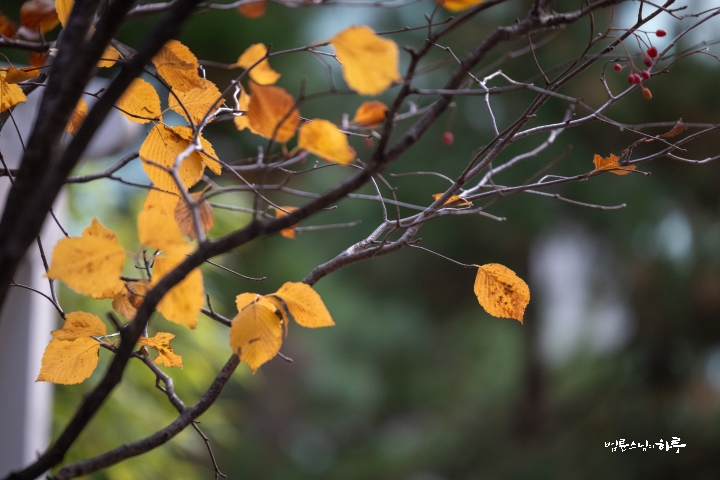
After completing morning practice and meditation, Sunim began the day at 7 AM with an online Dharma Q&A session with Jungto Dharma School students from the broadcasting room at Seoul Jungto Center.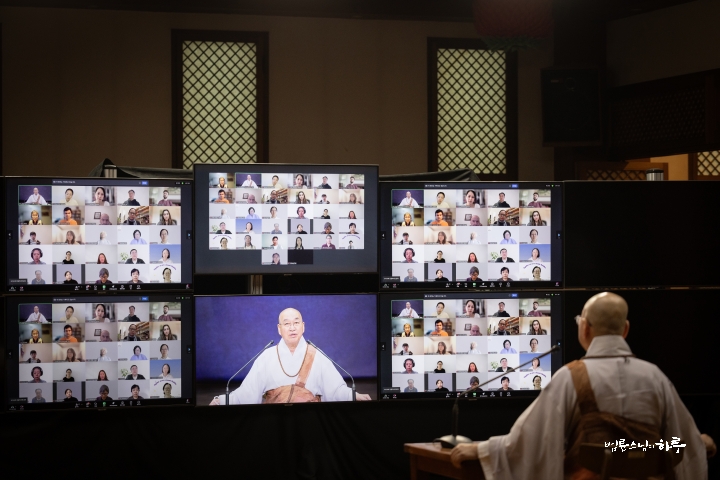
Thirteen students taking Jungto Dharma School classes from around the world – Australia, the United States, Korea, Cyprus, Germany, the United Kingdom, and Canada – gathered together in the online space. Realizing that learning knows no borders, everyone warmly greeted each other.
When Sunim entered the video conference room, three students representing the group shared their impressions of the classes they had taken so far.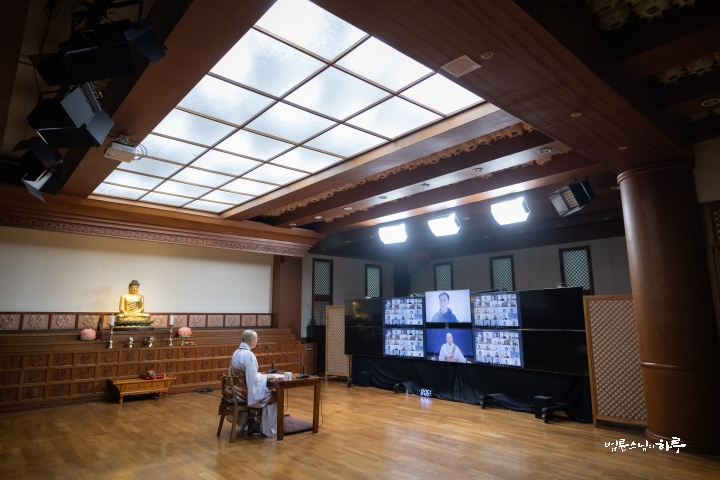
“It has been an extremely valuable experience, which I continue to enjoy as a continuation of Part I of the course. I can say that my favorite aspect of the course has always been the sharing. I have learned a lot from the group I share the course with. So, yes, that’s great.”
“This experience has been extremely valuable for me as well. I remember starting Buddhism I earlier this year. I wasn’t very keen on taking the class. I did it more to make my mom happy, but it was a life-changing experience. Now, I feel like I have definitely changed for the better. My mom, my boyfriend and my family have all noticed a change in me. I just feel a lot calmer and happier overall. It’s definitely improved the quality of my life. I’m so grateful for this course that I want to stay and volunteer with Jungto Society after it ends.”
“At first, sharing was a bit difficult for me, but it has also been one of the highlights of the course. I got much better at expressing myself.”
Through the students’ presentations, it was evident that Jungto Dharma School had become a place where lives were being transformed. The students then requested a Dharma talk from Sunim with three bows. Sunim emphasized that studying the Buddha’s life is essential to understanding the difficulties of practice and developing a Buddhist perspective on social and historical issues.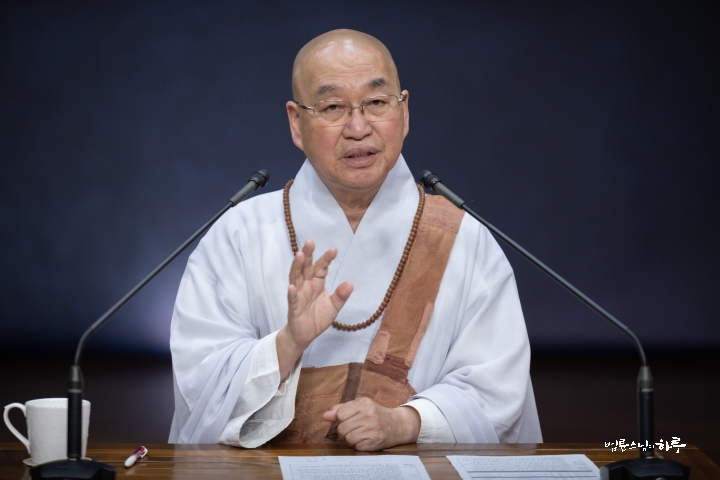
“The Buddha’s teaching is about ‘how to live without suffering.’ No matter how much life conditions improve, human suffering does not disappear. That’s why Gautama Siddhartha also said, ‘The path I have lived until now is not the path to happiness,’ and sought a new path. The process of finding a new path is difficult. Yet we find it difficult even to follow that new path that has already been discovered. This is because we still lack the firm realization that ‘the life I have lived until now was not the path to happiness.’ That’s why even with a little difficulty, we quickly want to return to our familiar old life.
The first reason we need to study the Buddha’s life is to understand that the various difficulties encountered on the path of practice are natural processes, enabling us to continue practicing steadily. The second reason is that through mental cultivation alone, we cannot know how to view and respond to the various social problems we face in daily life. Since the Buddha was not a divine being but a historical figure who lived in society, we can learn from his daily life how he responded to issues such as war, class discrimination, gender discrimination, and criticism and insults of his time.
I personally liked Buddhism, but I was greatly disappointed seeing Buddhism turn away from social issues and lean on power. So I asked myself, ‘Who exactly was the Buddha?’ and began studying the Buddha’s life from the beginning again. Only then did I discover the ‘human Buddha’ with social and historical consciousness. This led me to resolve to restore the Buddha’s original teachings in the place where I live. So you too must study the Buddha’s life. Only then will your practice remain steady, and you will gain wisdom to view the world we live in.”
Next was a time for freely asking questions about things they were curious about while taking classes. Six people pressed the raise hand button and asked Sunim questions. Questions about class content came up, as well as personal concerns – a variety of questions followed. Among them, one person asked for Sunim’s advice on how to maintain perspective, feeling that the teachings to be content with the present and to act for change seemed contradictory.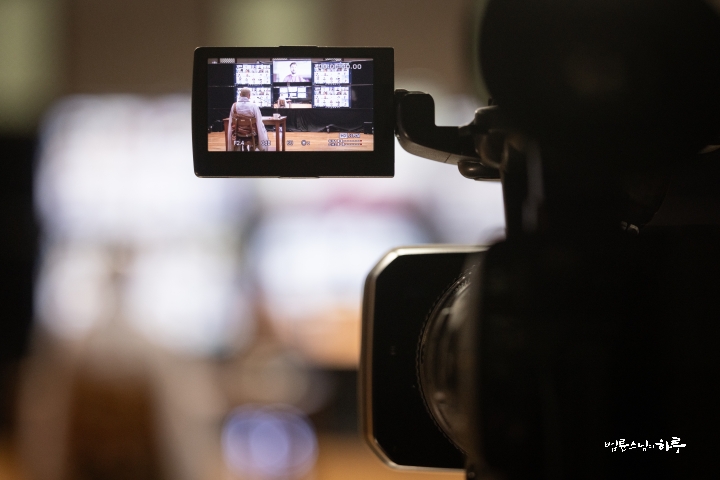
Be Content with the Present vs Act for Change… It’s Really Confusing
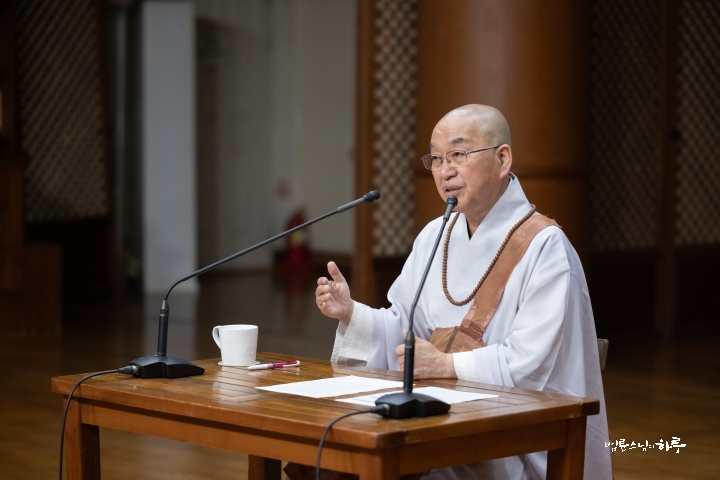
“When the Buddha said in his youth, ‘I don’t yet know where to go, but at least this path I have lived until now is not it,’ these were words spoken while still living a worldly life, before discovering a new path, before renunciation. He went through many trials and errors searching for a new path. And when he finally discovered the new path, the defilements and wandering in his mind disappeared, and deep peace arrived.
Imagine walking a path with your eyes closed – since you can’t see ahead, you would naturally be cautious and fearful, doubting ‘Is this the right path?’ However, the moment you open your eyes and can see the path clearly, you can walk forward without hesitation. Think of it as similar to this state. The Buddha helped those walking with closed eyes to open them. When someone complained about not being able to go where they wanted, the Buddha didn’t take them to their desired destination but helped them ‘open their eyes’ so they could find the path themselves.
The Buddha’s teaching was to first stop for a moment when suffering arises and quietly observe your own mind. When you examine ‘What is the problem?’ you realize there actually isn’t anything that can be called a problem. Then there’s no reason to be afraid either. However, if when you stop and examine, you clearly think ‘Not this path, but that path is right,’ then whether you continue on the same path or change direction to a new one, you can go either way without fear. So the first step is to stop. When you stop and examine, if there’s no problem, continue as you are; if you see a clear direction, go in that direction.”
“Your answer did make sense. We have to stop and assess whether it’s actually a problem. If so, and if we decide that we need to make a change, then we can take that path. I will take that advice with me.”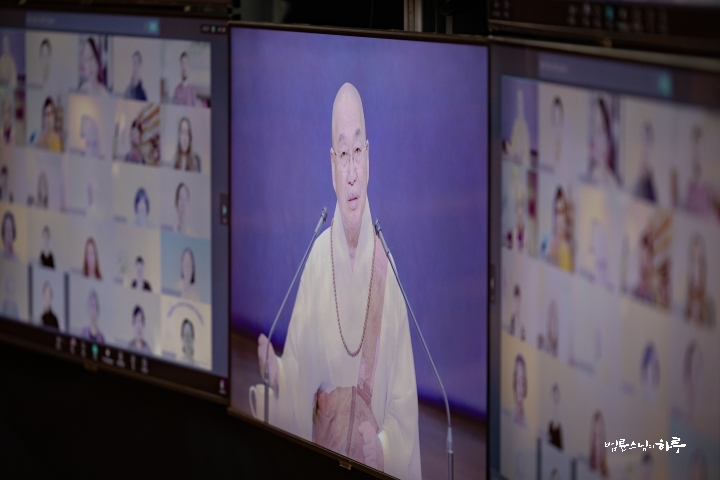
Questions continued one after another.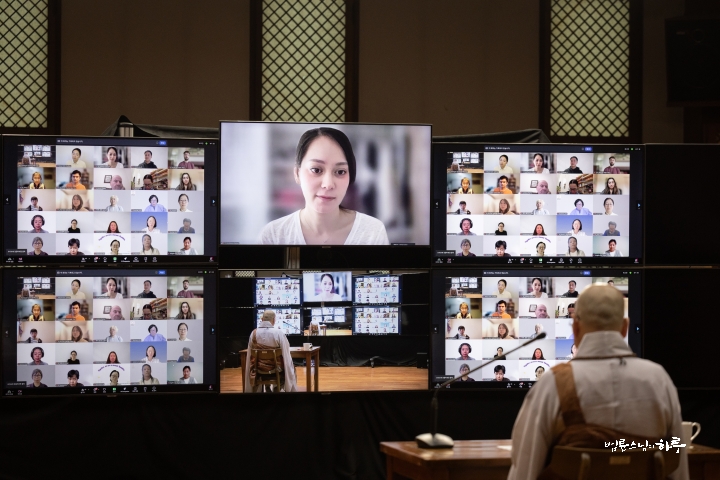
-People in old stories seemed to easily attain enlightenment just by hearing Dharma talks, but why do modern people find it so difficult? Does the difficulty of enlightenment vary with the times and social environment?
-While leisurely people find it easy to start practice, how can busy modern people with many burdens encounter practice and reduce their suffering?
-I know that learning the Dharma makes one happier, but I’m curious why compassion or the desire to serve doesn’t naturally sprout within me.
-I’m curious if the monastic life is like a doctoral program of letting go of possessions and studying deeply. Is this the right understanding of the monastic lifestyle?
Time flew by as various questions were answered. The live broadcast ended at nearly 10 o’clock, with plans to have another session to address remaining questions.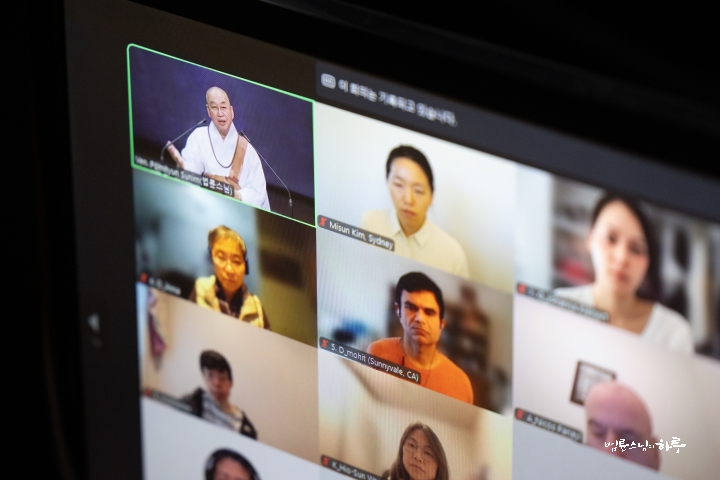
The students gathered in their group video conference rooms to continue with mindful sharing, while Sunim left the broadcasting room.
The street trees lining Seoul’s city center had already turned deep autumn colors. The flow of seasons quietly permeated every leaf rustling in the wind.
From 10 AM, the Happiness Movement Special Headquarters Day event began in the underground auditorium of the Jungto Social and Cultural Center. About 400 Happiness Headquarters members conducting Happiness Schools in 17 branches nationwide gathered in one place.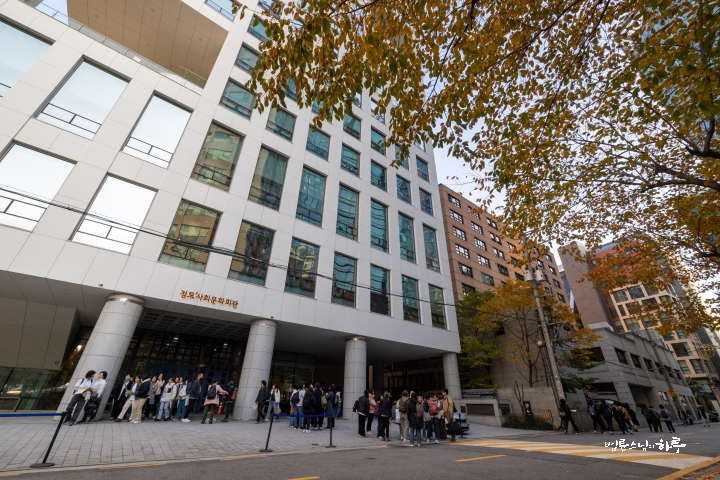
In the morning, the first program featured a dialogue session about Happy Citizens’ Group activities with Mr. Kwon Young-sun, Planning Committee Chair of The Peace Foundation. Looking back on three years of Happy Citizens’ Group activities and planning for the next three years, they envisioned the future that happy citizens would create together.
Afterwards, everyone unpacked the lunch boxes they had brought from home and ate in small groups. After lunch, from 1:30 PM, the second program began with a dialogue session with Venerable Pomnyun Sunim.
Before starting the second part, Happiness Headquarters members from the Incheon-Southern Gyeonggi branch performed a song. Recalling the reality that war still hasn’t stopped and tremendous killing and destruction of homes continues in Ukraine and Gaza, Palestine, they earnestly sang ‘That Shadow, That Fragrance’ with the heartfelt message that ‘war should never happen under any circumstances.’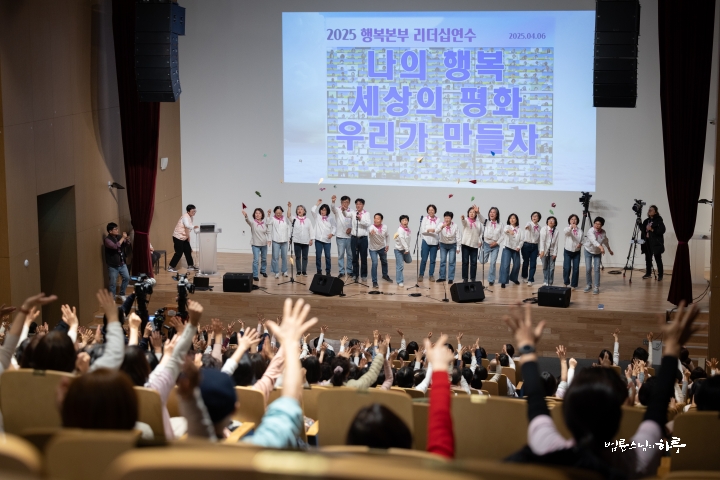
The audience responded with loud applause, praying for peace on the Korean Peninsula and in the world.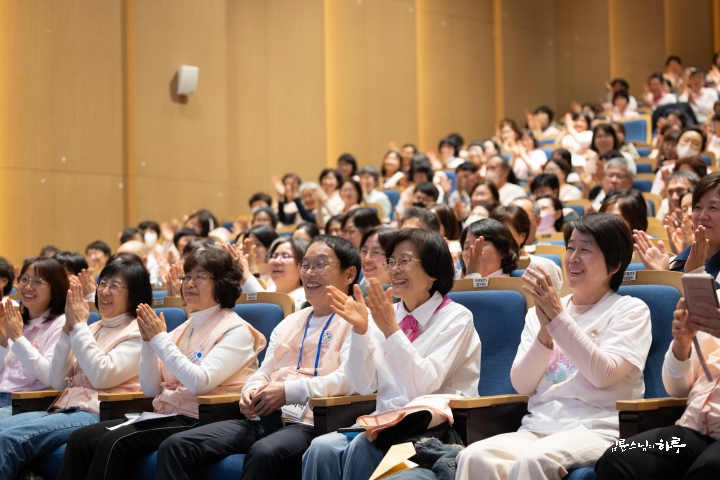
Next was a time to reflect on Happiness School operations and Happy Citizens’ Group activities and share impressions. First, they heard from those who had quietly held their positions in the Unification Special Committee and Happiness Headquarters for the past nine years.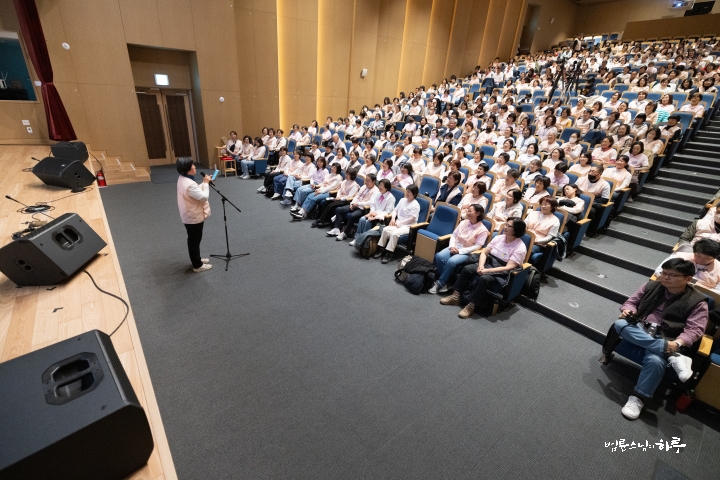
“Looking back on nine years, I see my footprints all over Jecheon. The people who came in slippers to Happiness School and environmental activities, the neighbors I met while distributing flyers as if earning day by day… All those moments were my warmest playground and the time that truly brightened my 50s. Thanks to everyone, I really played well, as if dancing.”
The presentation deeply showed ‘with what heart the community was built’ through nine years of cultivating every corner of the region with their own footsteps.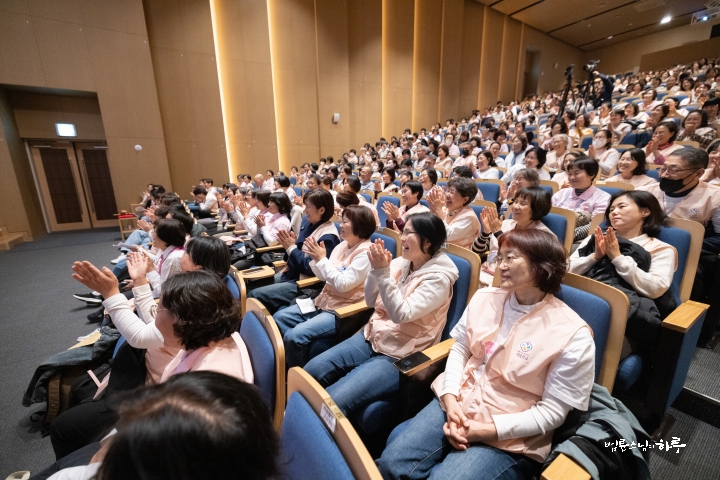
Next, they heard from six-year veterans who faced the wave of change called the COVID pandemic immediately upon joining the Happiness Headquarters and pioneered the new path of online Happiness School.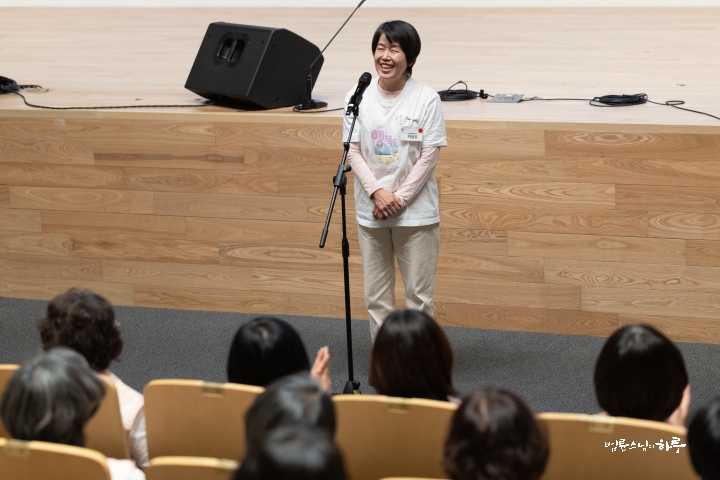
“I learned that a butterfly effect occurs when even just one person becomes happy. While facilitating, I used my son as a research subject to look into his heart, and our relationship transformed from being like enemies to supporting each other. What initially felt like work has now become my study, and I was able to discover the sense of justice within me that I had unconsciously overlooked.”
The presentation showed well how ‘one person’s happiness expands’ through the changes in practice that permeated even to family.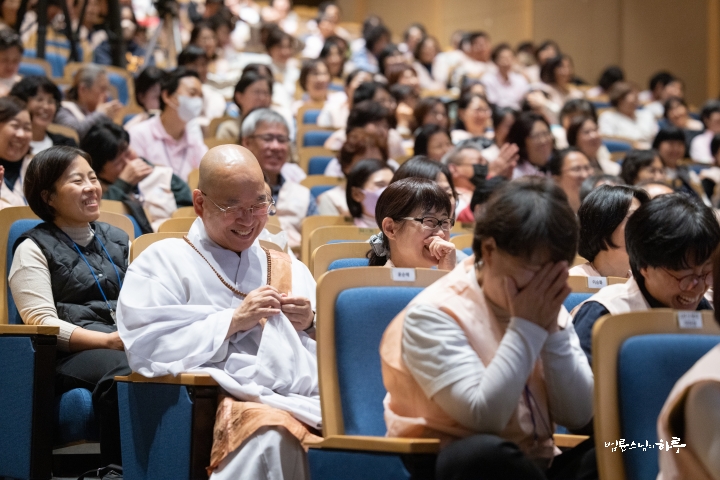
Finally, they heard from the fresh three-year Happiness Headquarters members who inherited nine years of precious achievements and are steadily building new manuals while infusing fresh energy.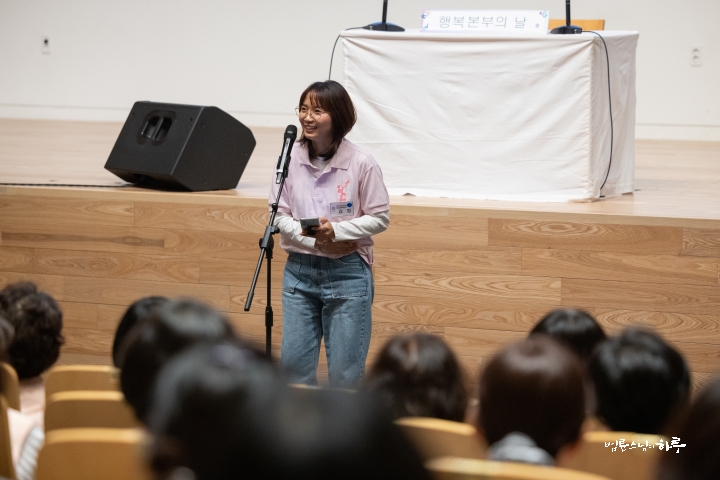
“The Happiness Headquarters was a practical field where I could actually apply what I had learned. In the process of planning and creating together from nothing and coordinating our differences, I felt that practice, which I had only known intellectually, was finally being exercised in life. I was able to come this far lightly and joyfully thanks to fellow practitioners who always embraced my shortcomings.”
The presentation honestly revealed ‘how practice is exercised in life’ through the process of learning while encountering challenges in the field.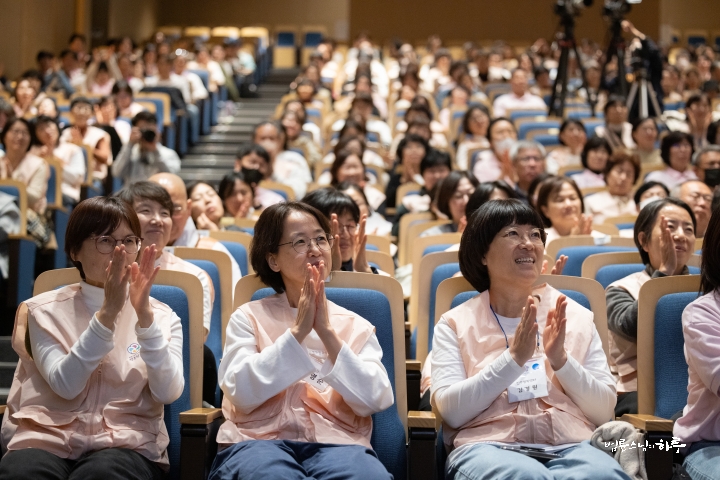
After sharing the activity stories of nine people, this time felt even richer.
Leaving behind the emotion and regret, everyone requested a Dharma talk from Sunim with three bows. Sunim began the dialogue by encouraging the Happiness Headquarters members who had been actively working for as long as nine years or as short as three years.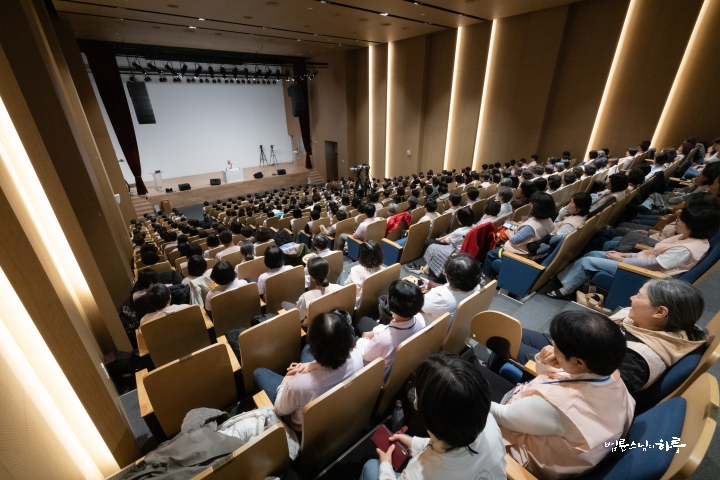
“You have all worked so hard in your respective regions over the past three years. Originally, Jungto Society is supposed to rotate positions every three years. Usually they change every three years, but if necessary, we approve maintaining the same position for up to six years. However, considering the pioneering period of the Happiness Movement Headquarters, some have been active for up to nine years. Those who have been active for nine years, please stand up.”
When those who had been active for nine years stood up, everyone gave them a big round of applause.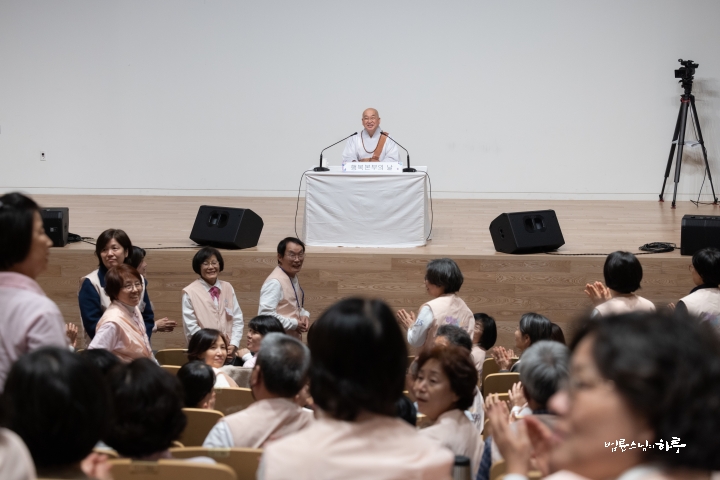
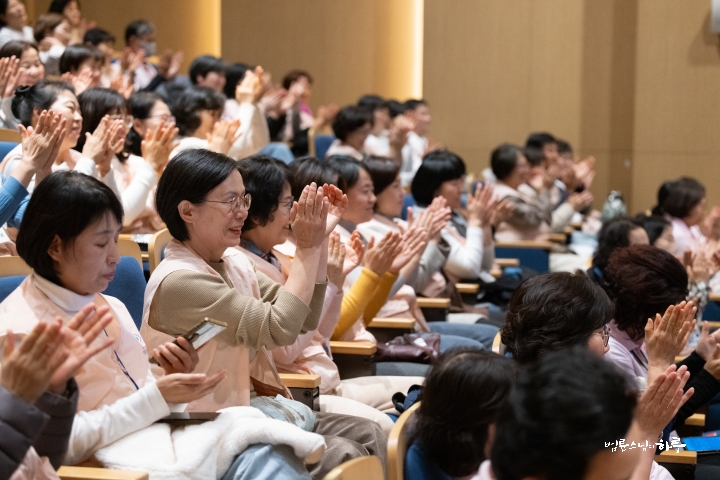
Subsequently, those who had been consistently active for six years and three years also stood up in turn and received big applause.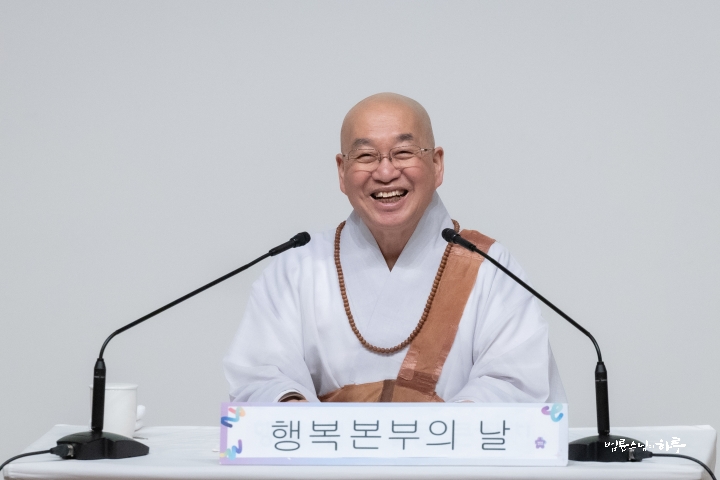
“Thank you for your hard work. According to Jungto Society’s position rotation principle, those who have been active for nine or six years must all return to their local chapters next year during the second 1000-Day Practice. Are you worried that the Special Happiness Movement Division might collapse? (laughter)
But don’t worry. The Special Happiness Movement Division will run well even without you. When there are nine-year and six-year veterans, the three-year members are treated as rookies. But next year, you’ll no longer be rookies but central figures. Please play the role of adults well starting next year. (laughter)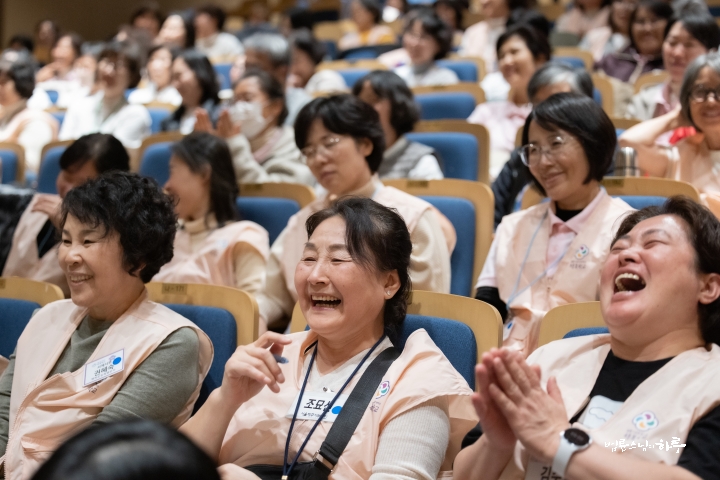
The Reason for Position Rotation: Organizational Wisdom Connecting Practice and Social Action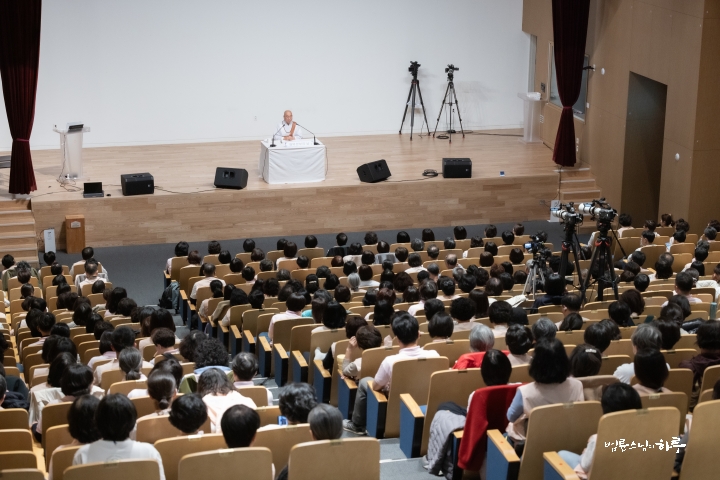
There are two reasons why Jungto Society has a position rotation system. One is because Jungto Society is a practice community that values practice above all, and the other is to organizationally share different experiences. While free activity is good, it’s necessary not to monopolize that experience individually but to share it organizationally. Jungto Society places great emphasis on the principles of practice, but since the Special Happiness Movement Division conducts civic movements without using Buddhist terminology, it has the advantage of being able to work creatively and freely. However, with prolonged activity, there’s a risk of becoming worldly and losing awareness as a practitioner or missing Jungto Society’s principles. That’s why you need to realign yourselves. Institutionally, these shortcomings can be compensated through position rotation.
Since its founding, Jungto Society has operated from the perspective that ‘practice and social action are not two separate things.’ However, in reality, most tend to lean toward practice and can be somewhat passive in social action activities. That’s why when you return to Jungto Society’s local chapters, you need to make good use of your experience in social action activities from the Special Happiness Movement Division. For example, in the case of Jungto Dharma School, while the academic schedule proceeds steadily, even facilitators are often passive when it comes to conducting environmental action activities, JTS fundraising activities, or unification campaigns with students. As a result, practical activities tend not to be very active. When you return to local chapters this time, I hope you’ll breathe new life into social action activities in each region. This is precisely why we have position rotation. It’s to create synergistic effects by integrating the experience gained through civic movements into Jungto Society activities.”
Following this, anyone could raise their hand and ask Sunim questions about any concerns they had while being active. One person asked for Sunim’s advice on what perspective to have as a group facilitator, mentioning that when seeing someone absent from activities due to illness, they sometimes feel like skipping too.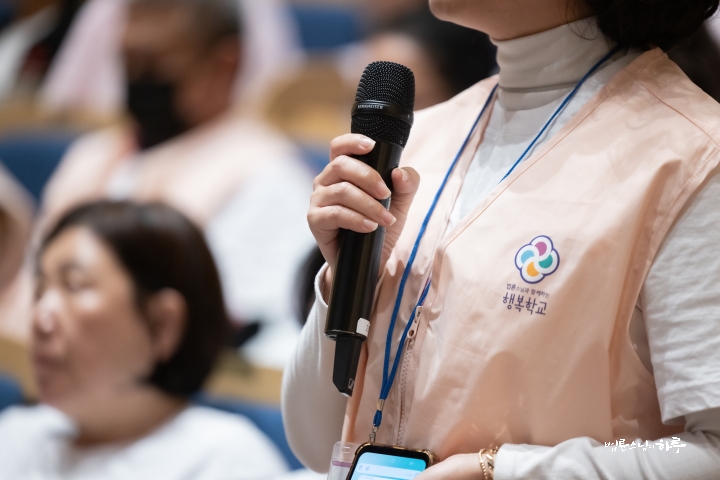
When the Feeling of Not Wanting to Do It Arises, Is It Okay to Quietly Skip?
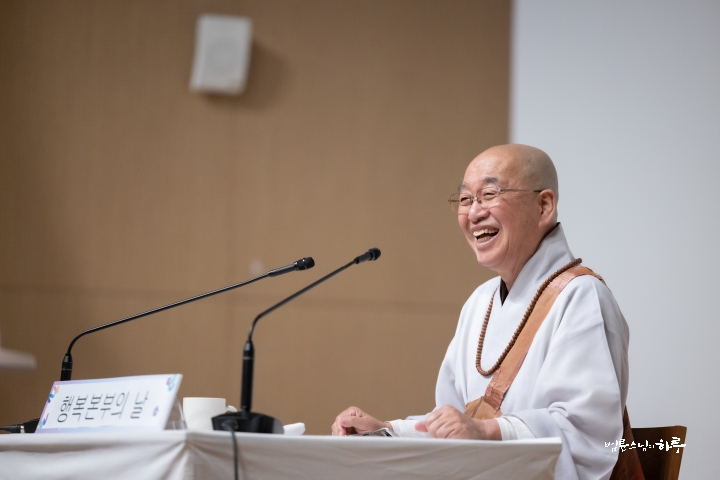
“Yes, it’s okay to do that. However, if you do it often, you’ll probably get sick in the future too. If you envy people who skip activities because they’re sick and want to be like them, your body needs to get sick, right? Which is better for you – not participating in activities because you’re sick, or participating in activities while healthy?”
“It’s better to be healthy and participate in activities.”
“For example, when your husband does business that you oppose, if you keep creating conflict, that business will fail. Why? Because the business needs to fail for you to be proven right. If the business succeeds, you’ll feel deflated in front of your husband. If your husband says, ‘See? It worked out just as I said,’ your spirit will be broken. The business needs to fail so you can say, ‘See? I told you it wouldn’t work.’ Then you’ll feel satisfied. But while feeling satisfied is nice, if your husband’s business fails, the loss is significant. Do you prefer feeling satisfied, or would you rather have your husband’s business succeed even if it makes you feel frustrated?”
“I prefer feeling satisfied.”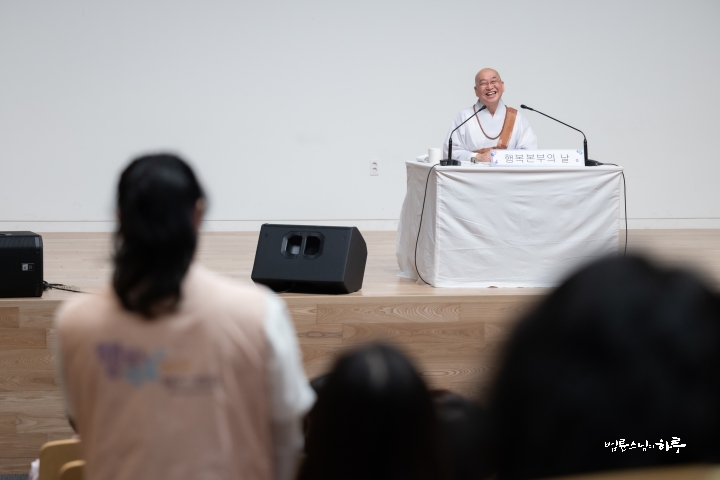
“Amazing. You’ve left me speechless. So it’s okay if your husband’s business fails?”
“Sunim, I think I answered incorrectly. It’s better for my husband’s business to succeed even if I feel frustrated.”
“You can initially express your opinion to your husband. You can say, ‘Honey, I don’t think that will work.’ But if his determination to try is too strong and it seems useless to stop him, it’s better to support him by saying, ‘Then, give it a try.’ If you keep trying to stop him, the wish that ‘I hope that business doesn’t go well’ can grow stronger in your heart. Similarly, if you see fellow practitioners who are sick frequently absent and you want to skip too, your wish becomes wanting to be sick. That’s why the probability of getting sick increases.”
‘My fellow practitioner can’t attend because they’re sick, but I’m healthy so let me participate.’ 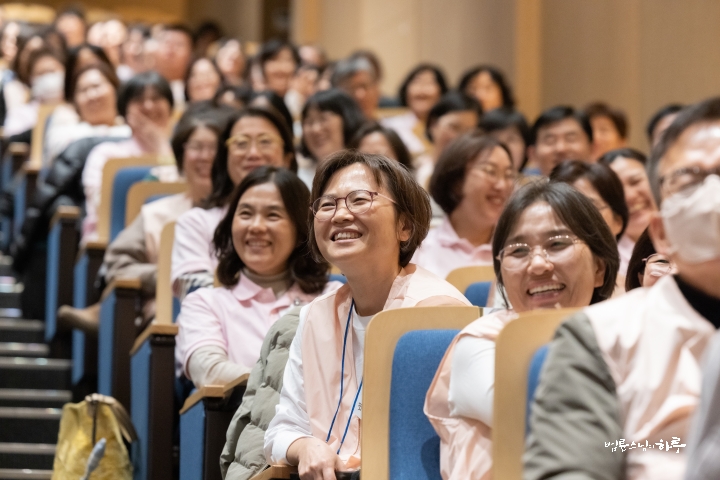
This is the mindset you should have to reduce the probability of getting sick. As the old saying goes, ‘Things happen as you wish.’ Unconscious wishes are that important. Even if you go to the temple and pray, ‘Please make my husband’s business successful,’ if you’re thinking inside, ‘This person doesn’t listen to me, so he’s in trouble,’ your inner thoughts are more likely to become reality. This is because inner thoughts influence the unconscious and become stronger wishes. So with such a mindset, it’s better not to pray at all. There’s no prayer effect anyway.
So regarding fellow practitioners, you should view them positively thinking, ‘How sick they must be to act like that,’ and actively think, ‘As a healthy person, I’ll do their share too.’ That’s how you can continue to stay healthy.”
“I understand well.”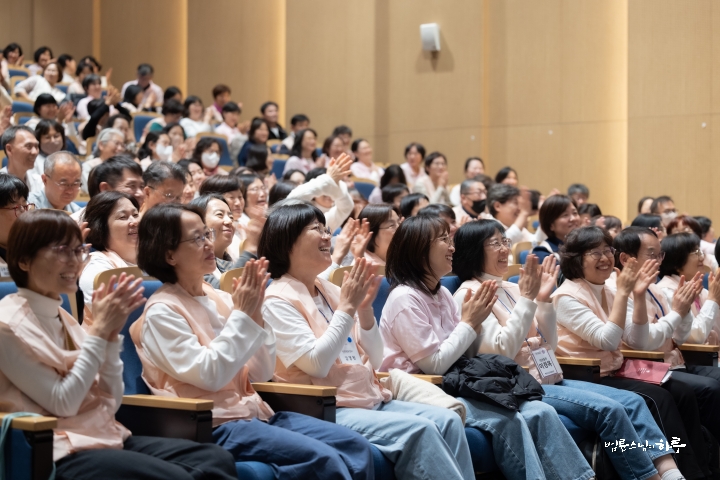
Questions continued to follow.
-While practicing the consumption pause activity, I’ve had questions about the standards and boundaries between necessities and desires for food and daily necessities. How far is basic necessity in food consumption, and where does desire begin?
-As a new group facilitator, I accept various roles like a fun game, but I’m concerned whether such a light attitude is okay. What attitude should I have toward my duties to be used well and grow for a long time?
-Could we establish a recommendation system or bonus points so that experience in the Special Happiness Movement Division can be recognized within Jungto Society?
-I’ve enjoyed serving as village chief for 6 years with high resident satisfaction, and I’m being asked to continue, but I have to stop the happiness movement next year due to the position rotation system. Should I continue the village chief role?
-Running a Happiness School with only 3 participants feels like a waste of resources. How about postponing to next month until more people gather?
After answering all the questions, it was time to conclude. Sunim reminded us of the direction of the new civic movement we need to create in this phase of change.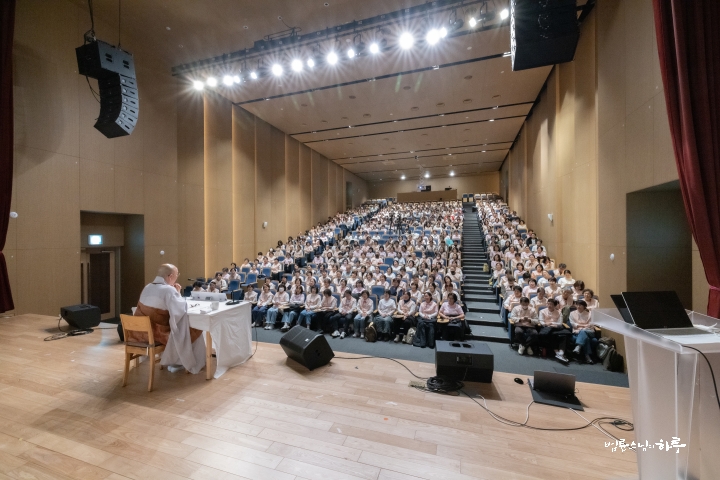
“Our society is currently in a period of transformation in many ways. Rather than confusion, it would be more accurate to say we’re going through a phase of transformation. The reason Jungto Society held the Youth Festival was in this context. The intention was to create a new culture needed by young people. Usually, such events are evaluated based on how much profit remains, but the Youth Festival was not originally aimed at profit. The evaluation criteria were what experiences the young people gained, how much it encouraged them, and how happy they were in the process. In other words, it wasn’t evaluated by capitalist performance indicators.
The New Civic Movement Created by Happiness School
Happiness School is also part of the same trend. We continue steadily, hoping it will develop into a national happiness movement. Although it was started by Jungto Society, which originated from Buddhism, Jungto Society’s goal is not to remain within the specific boundaries of Buddhism. Its purpose is to hope that the people of the Republic of Korea and, furthermore, all people in the world can be free from suffering.
In fact, when we started Happiness School, there were many daunting aspects. There was no place to benchmark. When things are difficult, if there are precedents to refer to, you can go and learn from them, but the direction Jungto Society set was ‘let’s create and experiment ourselves.’ As mentioned in the testimonials earlier, during the first three years, we had to create the programs ourselves, gather people to work with ourselves, and find venues ourselves. It wasn’t an easy process. But looking back, that experience became an opportunity to make us more creative and proactive. 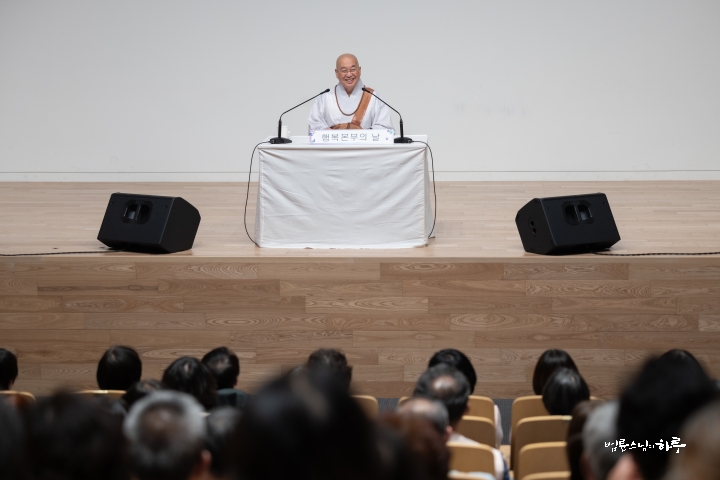
Starting Locally to Change the World
Among those who want to study the mind, there are people who feel burdened by Jungto Society’s Buddhist identity and have a rejection reaction. So we created Happiness School as a program where people can study the mind without the Buddhist name. While the big goal of ‘making people happy’ is the same, Jungto Society and the Happiness Citizens Movement have slightly different ways of operating. While Jungto Society is a pyramid-type organization where central and regional organizations are connected, the Happiness Citizens Movement centers on regional organizations, and these regions form a horizontal network. The Special Headquarters for Happiness Movement plays a supporting role for this organization. As the number of happy citizens increases and they become the center, it will develop into regional organizations centered on happiness centers and a national network where each regional organization is organically connected. This is a new form of civic movement that didn’t exist before, and it can be called the practice of grassroots democracy starting from the very bottom. You are now creating a new history of leading social change from the local level while studying the mind yourselves. With such goals, I hope those of you working at the Special Headquarters for Happiness Movement will approach this with a bit more confidence.”
The Happiness Headquarters members responded to Sunim’s words with loud applause.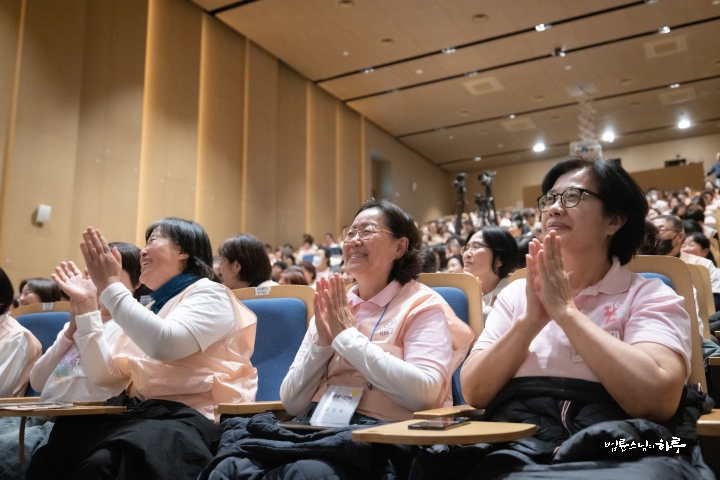
Next, they had time to express gratitude as they wrapped up the past three years. First, they presented a bouquet of flowers with gratitude to Venerable Pomnyun Sunim, who led the community and gave loving teachings so that they could freely carry out activities to create personal happiness and world peace.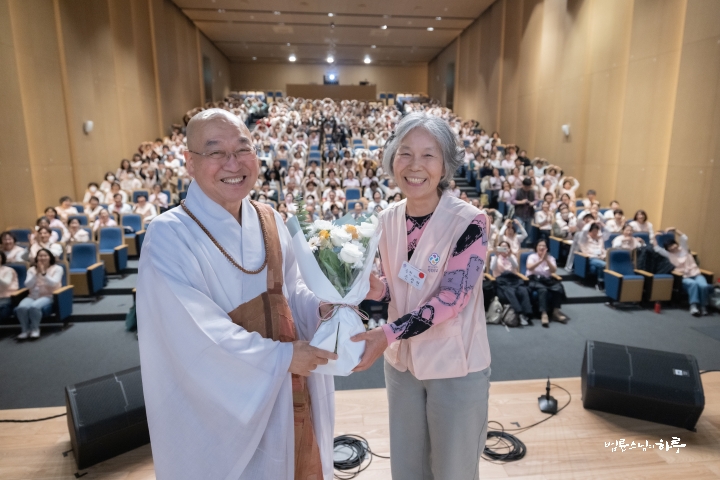
Son Jeong-yeon, who was selected as the most frequent facilitator for conducting Happiness School over 40 times in the past three years, presented the bouquet to Sunim. The community shouted loudly with applause.
“Thank you, Sunim!”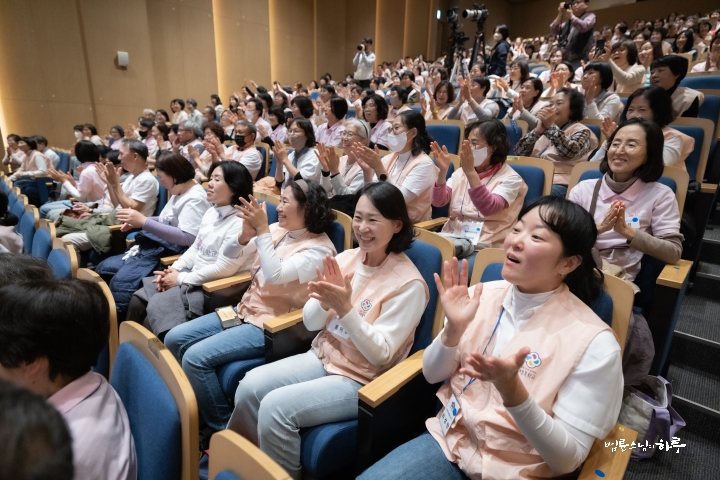
Next, they delivered a crown and cake with gratitude to Kwon Young-sun, Planning Committee Chair of The Peace Foundation, who guided and led the Happiness Headquarters members in both material and spiritual aspects. Receiving the cake, Chair Kwon encouraged the Happiness Headquarters members once again.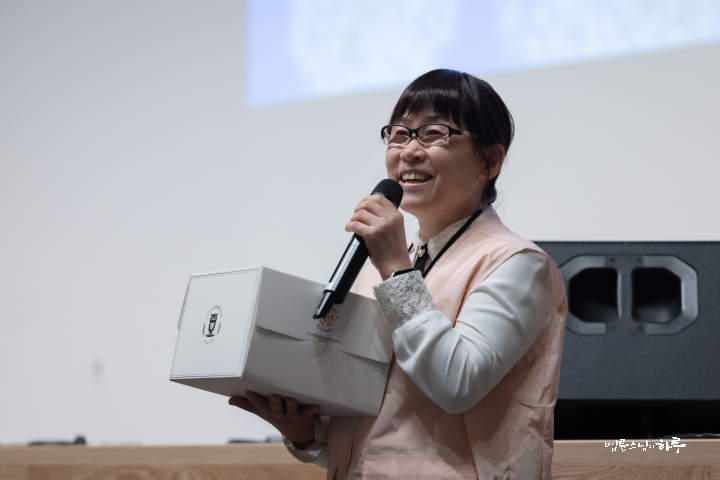
“We are now in an era of upheaval where we need to study and think intensely. If AI continues to develop, we might see an era where humans are prohibited from driving cars. So I hope you will also take the lead in pioneering AI Happiness School. Thank you all for your hard work.”
Next, the Happiness Headquarters steering committee members came forward to greet everyone, followed by group facilitators and center directors who all stood up from their seats to greet each other, sending warm applause to one another.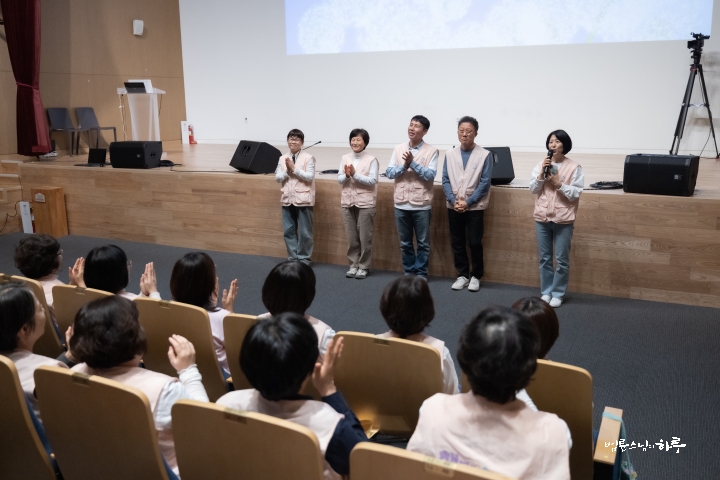
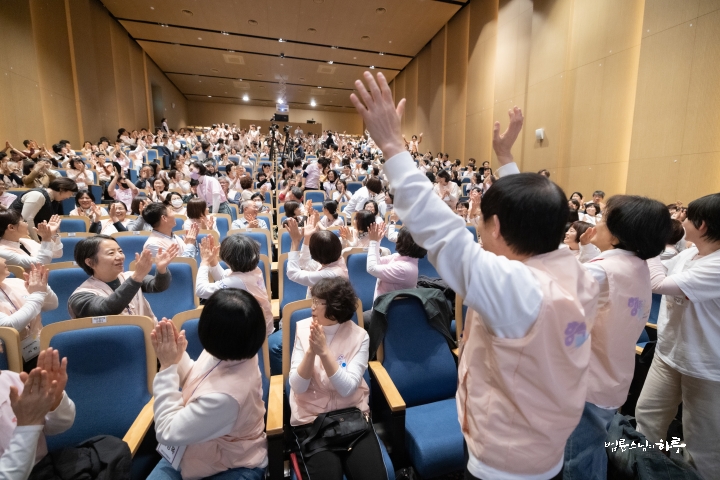
Next, the chapter presidents and chapter Dharma teachers came forward one by one to greet everyone. The members of the Sangha made heart shapes with their hands to express gratitude to one another for their hard work.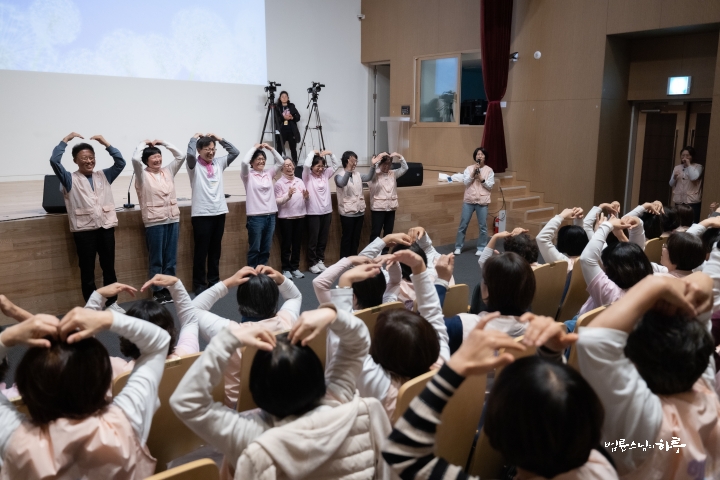
Finally, all members of the Support Division and Activity Division came forward to greet everyone. Thunderous applause erupted.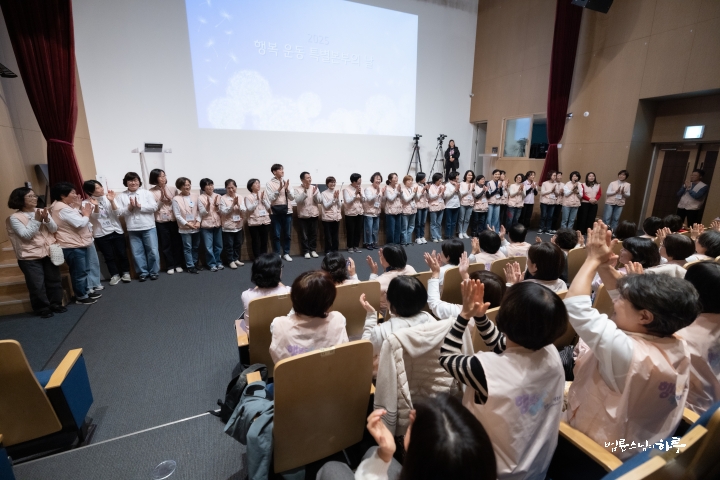
The time of gratitude and encouragement concluded with a commitment to continue the momentum of the National Happiness Movement by enrolling 5,000 people in Happiness School by the end of December.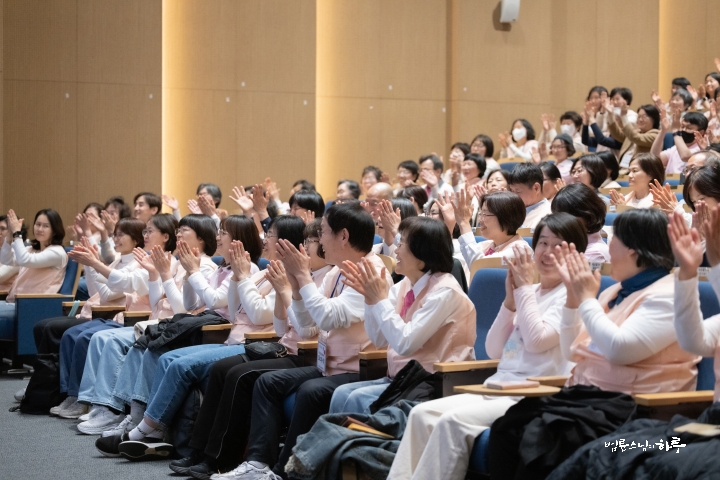
Next, Dharma Teacher Hyangsang, who is in charge of the Special Headquarters for the Happiness Movement, gave closing remarks.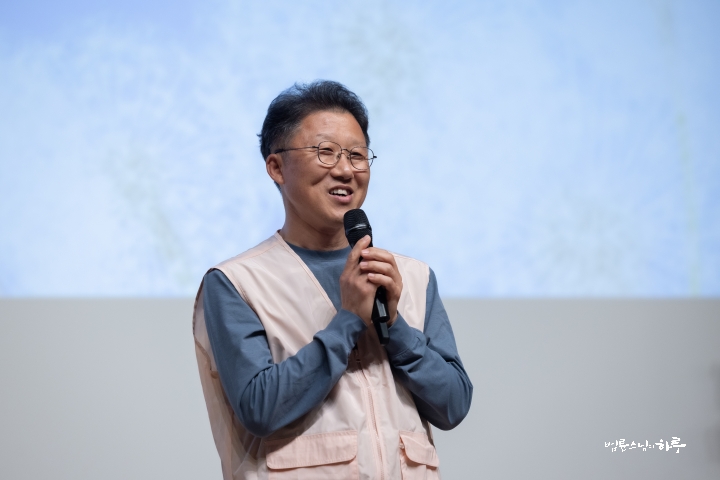
“It’s truly moving to see this place filled to capacity. I would like to once again thank the senior volunteers who have been paving the way through trial and error. Since the transition is already well-prepared, I believe the junior volunteers will continue to do well even after you move to regional chapters. I expect that your experience will expand greatly in the second 1000-Day Practice, making local citizen groups the center of a new grassroots movement. Thank you all for your hard work.”
Next, everyone watched a video showcasing the activities of the past three years. As memories were recalled, eyes quickly became teary.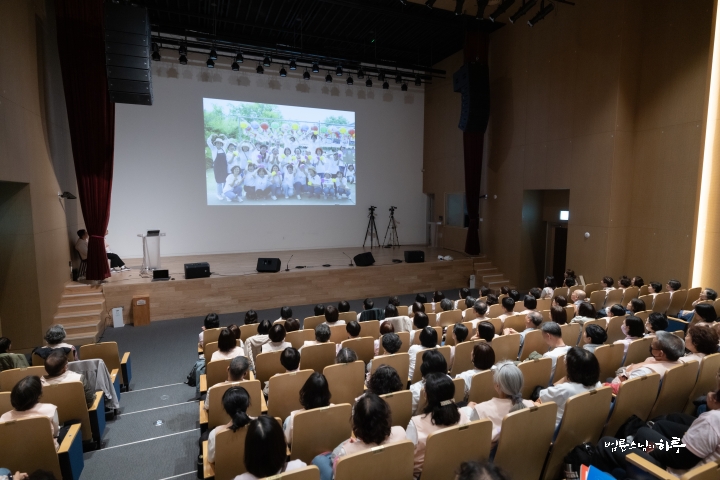
Finally, everyone took a commemorative photo together to remember this day.
“My happiness, world peace!”
Shouting loudly, the last Special Headquarters for the Happiness Movement Day event of the first 1000-Day Practice came to an end.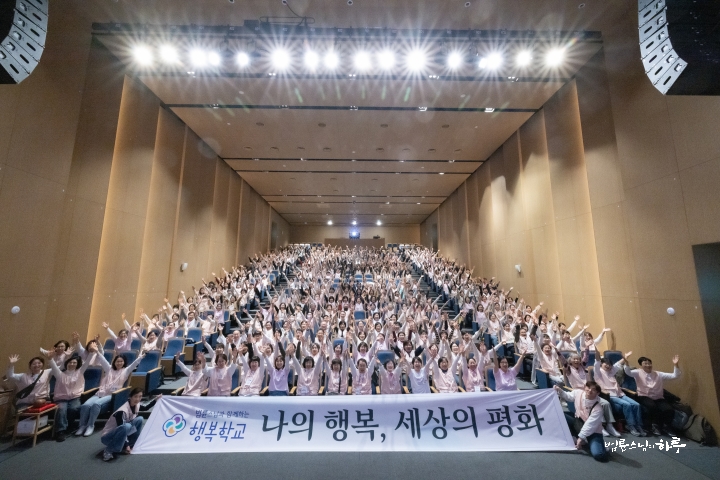
After leaving the Jungto Social and Cultural Center, all the members headed home, while Sunim packed his belongings and headed to Gimpo Airport to catch a flight.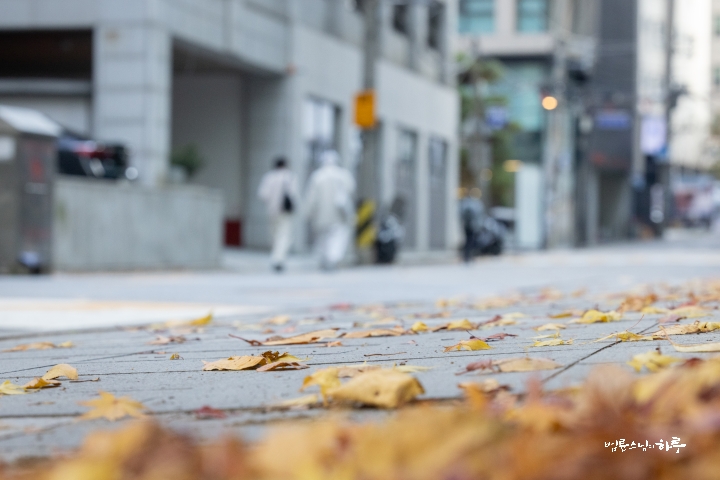
After an hour’s drive to Gimpo Airport, Sunim boarded a flight to Jeju departing at 6:40 PM. However, the flight was delayed by about 40 minutes, landing at Jeju Airport after 9 PM.
Upon exiting the airport, Jungto Society members warmly welcomed Sunim. He immediately went to his accommodation, unpacked, had a late dinner, and concluded the day’s activities.
Tomorrow, at the invitation of Jeju Development Corporation, Sunim will give a Dharma Q&A for their employees. In the evening, he will continue with the seventh Happy Dialogue Dharma Q&A at the Seogwipo Arts Center.





